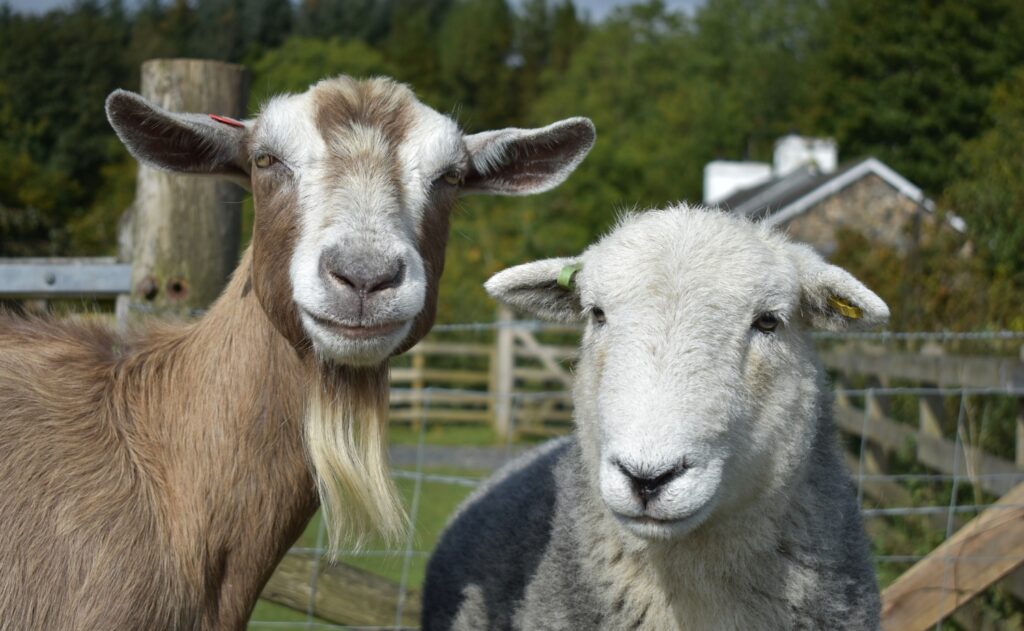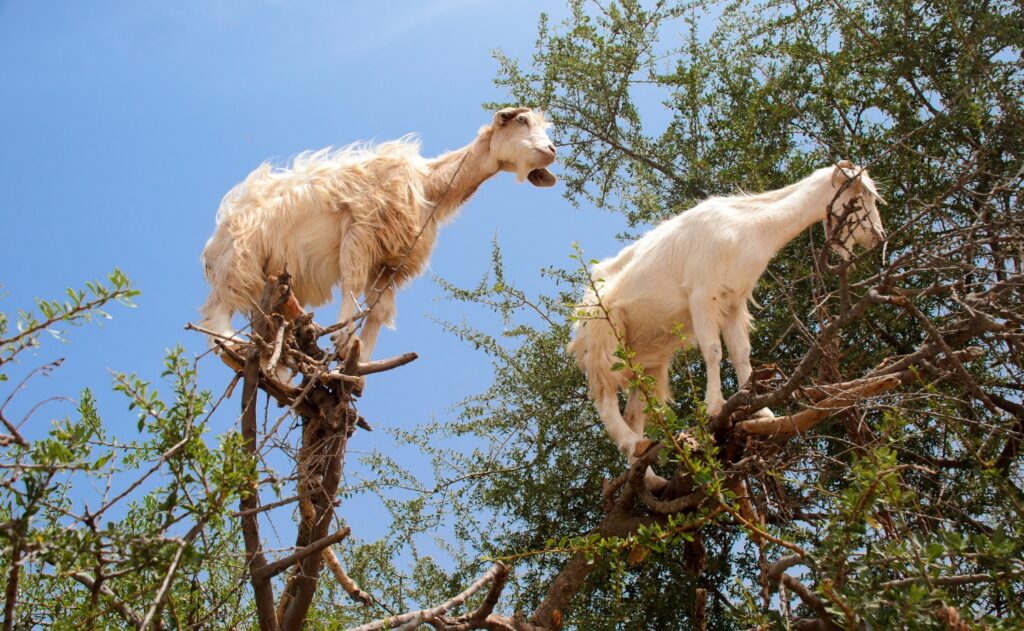Discover why are sheep more popular than goats for farming in this engaging blog. Find out why farmers choose sheep in this engaging blog.
Table of Contents
Introduction
Choosing between farming sheep and goats can be a tough decision for many. Did you know that sheep are often more popular animals to farm? This blog will explore the reasons behind this preference, giving you insights into both animal types.
Get ready to learn why sheep might just be your best bet on the farm.
Key Takeaways
- Sheep offer valuable products like wool and milk, making them economically beneficial for farmers.
- Due to their hardiness and less mischievous nature, sheep are easier to manage and cause less damage, lowering maintenance costs.
- Sheep’s preference for upland grazing enables them to thrive in diverse environments without harming the landscape.
- Beginner farmers find sheep more suitable because they are gentler and easier to handle than goats.
- The market for sheep products is robust with consistent prices, providing a reliable income source for farmers.

Image Source: Canva
Benefits of Raising Sheep
Raising sheep offers numerous benefits such as providing valuable resources like milk and wool, thriving in upland grazing conditions, seeking shelter readily, and being less mischievous.
Additionally, they tend to not get their feet wet and are hardier compared to goats.
Hardier and less mischievous
Sheep show remarkable hardiness, thriving in environments where other livestock might struggle. Their resilience is linked to centuries of selective breeding for survival and productivity in diverse climates, from the rain-soaked hills of New Zealand to the harsh winters of Scotland.
This hardiness allows them to adapt well to both extreme cold and heat, making them a reliable choice across various farming landscapes. Unlike goats, sheep cause less trouble because they possess a more docile temperament.
They are less likely to escape enclosures or nibble on everything in sight, which significantly reduces farm damage and the labor needed for repairs.
Goats earn a reputation for being escape artists and having a voracious appetite for not just their feed but also farm structures and equipment. In contrast, sheep spend their time grazing more peacefully without causing such headaches for farmers.
Their less mischievous nature combined with physical toughness makes sheep particularly appealing for those interested in sustainable livestock farming on small farms or expansive upland grazing areas.
Sheep bring tranquility and resilience to farming operations.
Provide valuable resources (milk, wool)
Moving beyond their hardier and less mischievous nature, sheep also offer a wealth of valuable resources such as milk and wool. These products play a crucial role in both the textile and dairy industries, underlining the versatility of sheep farming.
Wool production stands out as a sustainable source of clothing and textiles, showcasing its importance in livestock management. Sheep milk, rich in nutrients, crafts fine cheeses favored globally, enhancing the profitability of keeping these animals.
Farmers appreciate sheep for their dual-purpose advantage; they can harvest wool annually without harming the animal, promoting sustainable livestock farming practices. This makes sheep an integral part of agricultural livestock operations focused on long-term resource management.
Their ability to provide both wool for textile production and high-quality milk positions them as invaluable assets to farmers around the world looking to maximize the benefits from their herds.
Seek shelter more readily
Beyond providing valuable resources like milk and wool, sheep show a natural tendency to seek shelter more actively than goats. This behavior greatly reduces the risk of them getting caught in bad weather conditions, which can lead to health issues or even loss.
Farmers appreciate this characteristic because it simplifies managing the livestock, especially during unpredictable weather patterns.
Sheep’s inclination towards finding cover on their own not only keeps them healthier but also lessens the workload on farmers who otherwise would need to herd them into shelters manually.
This adaptation aligns well with sustainable farming practices by ensuring that sheep maintain their well-being with minimal human intervention. It showcases why they are a preferred choice for both small farm setups and larger agricultural operations focused on profitable livestock management.
Tend to not get their feet wet
Sheep, in general, tend to avoid getting their feet wet. They are naturally inclined to seek higher ground and drier areas for grazing and resting, making them well-suited for upland grazing.
This behavior allows sheep to thrive in various landscapes and makes them a more manageable choice for farmers seeking livestock that can adapt to different environmental conditions.
Additionally, the tendency of sheep not to get their feet wet contributes to their ability to seek shelter readily. This quality ensures that they are easier to manage and protect during adverse weather or other challenging conditions, providing a level of reliability for farmers looking for low-maintenance livestock options.
Can thrive in upland grazing
Sheep excel in upland grazing environments, where they can naturally thrive. Their capability to graze on diverse mountain grasslands makes them well-suited for sustainable farming practices.
This ability allows them to efficiently utilize natural resources and contribute to the overall ecosystem balance in these rugged terrains. Additionally, their adaptability to upland grazing positions them as valuable assets for livestock management in hilly or mountainous regions.
Furthermore, sheep possess an innate instinct to seek shelter more readily than goats, enabling them to navigate and graze in challenging terrain with greater ease. This behavior aligns with their preference for upland grazing areas, making them a practical choice for farmers looking to harness the potential of elevated landscapes for livestock production and grazing density optimization.
Advantages of Sheep over Goats
Sheep are generally easier to handle and manage than goats, making them more suitable for beginners. They are also less destructive in the grazing area compared to goats.
Easier to handle
Sheep are known for being easier to handle compared to goats. They are generally more gentle and docile, making them better suited for beginners or those with limited livestock management experience.
This makes sheep a favorable choice for farmers seeking animals that require less effort and expertise to manage effectively.
More suitable for beginners
Sheep are considered more suitable for beginners due to their docile and gentle nature, making them easier to handle and manage. Their lower maintenance needs compared to goats also make them a more convenient choice for those new to livestock farming.
Additionally, sheep being hardier and less mischievous than goats can contribute to a smoother transition into animal husbandry, providing beginners with a manageable starting point when embarking on sustainable farming endeavors.
Less destructive
Sheep are less destructive to the environment compared to goats. Their grazing habits tend to be more careful, causing less damage to the pasture and vegetation. This makes them a more sustainable choice for livestock farming, especially in fragile ecosystems or areas where overgrazing is a concern.
Furthermore, their tendency to seek shelter also reduces soil erosion from trampling and ensures that they do not wander far from protective structures.
By nature, sheep are not typically prone to browsing trees and shrubs like goats often do. This behavior can help preserve wooded areas and prevent deforestation on farms where livestock coexist with natural habitats.

Image Source: Canva
Reasons for the Popularity of Sheep Farming
Sheep farming is favored due to lower maintenance and labor costs. The higher demand for sheep products and more consistent market prices are also contributing factors.
Lower maintenance and labor costs
Sheep farming requires lower maintenance and labor costs compared to other livestock. The hardy nature of sheep means they need less hands-on care, making them an ideal choice for beginners or those with limited time.
Their natural ability to seek shelter more readily also reduces the need for additional construction, while their grazing behavior helps manage vegetation growth efficiently. Additionally, sheep are generally easier to handle than goats, further cutting down on labor requirements.
These factors combined contribute to a more cost-effective and manageable farming experience.
The robust demand for sheep products and the consistent market prices make raising sheep a profitable venture with lower overheads. With versatile uses in wool production, milk, and meat, sheep offer multiple revenue streams that can help offset costs effectively.
Higher demand for sheep products
The higher demand for sheep products stems from their versatility in providing valuable resources such as wool, milk, and meat. Sheep are widely favored for their capacity to marble and produce a more favorable eating experience compared to goats, particularly for meat production.
Their wool is also highly valued in textile production, contributing to the consistent market demand for sheep products. In addition, sheep are viewed as being more docile and gentle than goats, making them better suited for various farming environments and sought after in many cultures.
The Bible references sheep more frequently than goats which further contributes to their popularity in farming and cultural significance.
More consistent market prices
Transitioning from the higher demand for sheep products to more consistent market prices, it is worth noting that sheep farming often benefits from steadier pricing compared to other livestock.
This stability in the market can provide farmers with a more predictable income stream and reduce the financial risk associated with fluctuating prices. The consistent demand for sheep products, including wool and meat, contributes to this reliable pricing trend.
Sheep’s higher demand “when compared” to goats could potentially be attributed “to their” ability further ensure steady market performance for farmers. This stable pricing encourages sustainable farming practices and supports a more secure income source for those engaged in sheep production, making it an appealing option for many livestock farmers.
Conclusion
Sheep outshine goats in popularity due to their ability to provide valuable resources like wool, milk, and meat. They are hardier, seek shelter more readily, and can thrive in upland grazing.
Sheep are also easier to handle, making them more suitable for beginners. Moreover, they are less destructive and have lower maintenance costs – all adding to their appeal for sustainable farming.
FAQs
What makes sheep more popular for farming than goats?
Sheep are preferred for farming due to their wool production, meat yield, and ease of handling in larger groups.
Can goats be farmed as effectively as sheep?
Yes, goats can be farmed effectively but are generally not as popular due to the lower demand for goat products compared to sheep products.
Are there any advantages to farming goats over sheep?
Some farmers prefer goats for their ability to thrive on less nutritious vegetation and their agility in navigating rough terrain.
Do sheep require different care compared to goats on a farm?
Both animals have specific care needs, but overall management practices may vary based on the individual farmer’s preferences and goals.
How do the costs of raising sheep compare to those of raising goats?
The cost of raising either animal can vary based on factors such as feed availability, healthcare requirements, and market demands for their products.